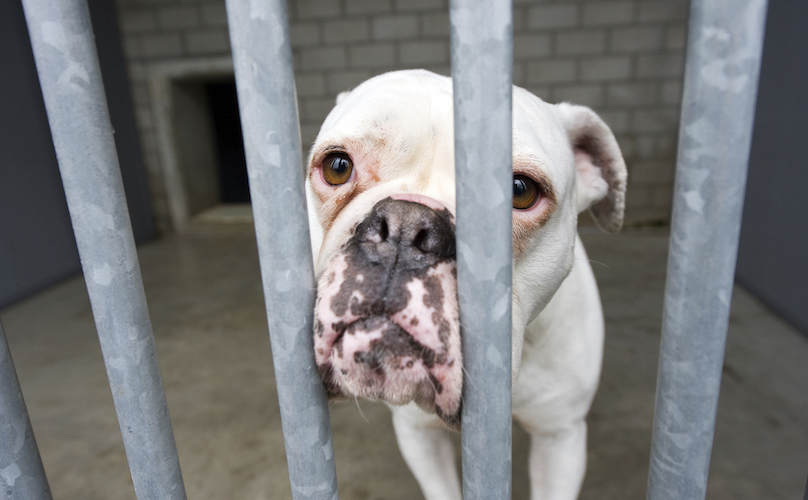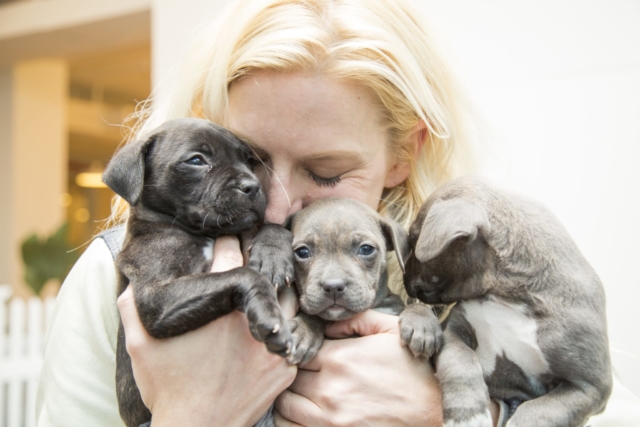***Looking for a gift to blow your new dog’s mind? Spoil them with a BarkBox! Every month BarkBox delivers 2 original toys, designed in-house, 2 full bags of all-natural treats, and a chew. Sign up here and receive a free extra toy every month. <– This deal is worth up to $120 in value if you sign up for a 12-month subscription! 🙂
Congratulations on your decision to add a new dog to your family! While it will surely be one of the most rewarding experiences of your life, there is also a lot to consider.
For one thing, where should you get your new dog? Should you adopt from a shelter? Work with a private rescue group? Or maybe you have your heart set on a purebred puppy from a local breeder?
Doing your research will help ensure the dog you choose is the best possible fit for your home and lifestyle.


What Are Your Options When Searching For Your New Dog?
When it comes to selecting a new furry friend, you have four main options: pet stores, breeders, shelters, and private rescue groups. Let’s explore each one to help you determine the right choice for you.
Pet Stores
Pet stores can be deceiving. While the dogs may look cute and healthy, they typically come from cruel, inhumane “puppy mills.”
Since the pups have monetary value, they receive some basic care and are cleaned up before being sold to pet stores. It is their parents that truly suffer.
These dogs are kept in tiny, filthy cages. They are overbred, underfed, and only valuable to the breeder if they continue to produce saleable pups. They are often kept outdoors, with only minimal shelter from the elements.


Puppy mill breeding dogs receive little physical attention and even less veterinary care. When they become too old or sick to breed, they are simply discarded.
When – and if – they are rescued, these dogs are usually sick, matted, and covered in parasites. Some have never felt grass under their paws.
What Is Being Done To Improve American Pet Stores?
The good news is that more than 290 cities and towns across America have banned the retail sale of puppy mill dogs. California and Maryland are the first to issue statewide bans with New York and several other states considering similar legislation.
Thanks to these laws, pet stores are filling their displays with puppies, kittens, and other pets from local shelters. Instead of purchasing an inhumanely bred pup, you can shop for a rescue dog instead!
Visit Best Friends Animal Society for a state-by-state log of municipalities in the United States and Canada with retail pet sale bans.


Breeders
Despite the horror of puppy mills, not all breeders are money-hungry villains. In fact, there are responsible breeders in every state if you know where to look.
Here are a few tips to help you find the right breeder:
Ask for Recommendations
The internet is full of gorgeous purebred puppies and trendy designer mixes, but photos can be deceiving. The best way to narrow down your list of potential breeders is to ask for recommendations from those you trust.
Many veterinarians keep lists of good (and bad) breeders in their area. Of the breeders their clients have dealt with, they can tell you which produce healthy pups.
You can also reach out to friends or family who have dogs of your favorite breed. Don’t know anyone personally? Chat with folks at the dog park or pet supply store. All dog parents love to talk about their pups!


Visit the Breeding Facility
Before you purchase a puppy, make sure you visit the breeder’s home or breeding facility. You want to see where and how the dogs live, as well as get a look at both parents.
If the breeder tries to talk you into meeting on neutral territory, or is in any way hesitant to show you how the animals are cared for – run.
Be Patient
Responsible breeders know that overbreeding is not in the best interest of their dogs. Instead of churning out litter after litter, they plan each one carefully.
This may mean there are no puppies available at the time you begin your search. The breeder may even ask you to join a wait list. If you are truly devoted to a specific breed, a healthy puppy should be worth the wait!
Trust Your Gut
Once you have found a breeder you want to work with, ask yourself the following questions before making your final decision:
-
How are the living conditions for the puppies and adult breeding dogs? Is their area clean, comfortable, and safe?
-
How are the dogs and puppies treated? Do they have healthy food and clean water?
-
Do the dogs have plenty of room to move around and play? Are there toys?
-
At what age are the puppies sold? (Pups should ideally stay with their mothers for about eight weeks)
-
Good breeders typically commit to one specific breed. Do you see several different breeds on the property? It may be a red flag.
Download this helpful PDF from the experts at the ASPCA if you plan to adopt from a breeder.


Shelters
Each year, approximately 1.5 million shelter animals are euthanized (670,000 dogs and 860,000 cats). Most of these pets are young, healthy, wonderful animals that simply ran out of time waiting for someone to adopt them.
Depending on where you live, you likely have access to several kinds of shelter. These may include public facilities like city and county shelters, animal control centers, or police and health departments. There are also private shelters such as those run by the Humane Society and the ASPCA.
Some of these shelters are “open admission,” meaning they do not turn animals away based on age, breed, health, or behavior. While this may sound like a good thing, open admission usually means overcrowding.
Some refer to these facilities as “kill shelters” because they must euthanize pets to make room for a continuing stream of new arrivals.
Limited admission shelters or “no kill” shelters take in far fewer pets, but those they do accept stay until they find forever homes. Euthanasia only occurs in cases of poor health or extreme behavior problems.
Shelters are dependent upon government funding, grants, and donations to keep the facility running and the animals cared for. They often have a mixture of paid staff and volunteers.
How much funding a shelter has will impact the care your new dog receives before adoption. Some have on-staff veterinarians, trainers, and even groomers, while others struggle to afford basic spay/neuter services.


Rescue Groups
Animal rescue groups are usually private, non-profit organizations. Some specialize in saving certain breeds, while others are open to all dogs in need. Like limited admission shelters, rescue groups have full authority over which animals they take in.
The dogs in their care may be taken in as strays from the local community, surrendered by their owners, or pulled from kill shelters. Many groups even welcome transported animals from high-risk geographic areas.
While some rescue groups have private facilities, others depend on volunteers to foster the dogs in their own homes.
Is Rescue The Right Choice For You?
If providing a loving home to a dog in need is more important to you than bloodlines and pedigrees, adopting from a shelter or rescue might be the right choice.
And frankly, even if you have your heart set on a particular breed, there are rescue groups that specialize in re-homing just about every breed. A simple Google search for your state and the breed you are looking for is sure to yield at least a few results.
In addition to breed-specific rescues, keep in mind that 25% of American shelter dogs are purebred!
Rescue also gives you the option of opening your heart to an adult or senior dog. Not only are these mature cuties especially grateful to find their forever homes, they have often mastered tasks like potty training and walking on a leash before they even enter your home!


Why Don’t More People Choose Rescue?
Rescue dogs often suffer from the stigmas attached to mixed breed dogs and those with unknown histories. However, statistics show that not only do many purebred dogs end up in shelters, mixed breed dogs are often misidentified.
Researchers at Florida State University asked pet professionals (vets, shelter staff, breeders, and trainers) to identify the breed mixes of a variety of shelter dogs. Their guesses added up to an average of 53 different breeds for each dog!
Shelter dogs are also victims of misinformation and unfair stigmas associated with their appearance. For example, those with no pit bull-type breeds in their DNA are mislabeled as pit bulls up to 48% of the time.


If you choose rescue, your dog may be a perfect fit right from the start. But more likely, he or she will need a bit of time and understanding to adjust to their new surroundings.
Just remember, where there is love, there is hope!
Looking For More Posts Like This?
The Worst (JK Best) Things About Adopting A Dog






